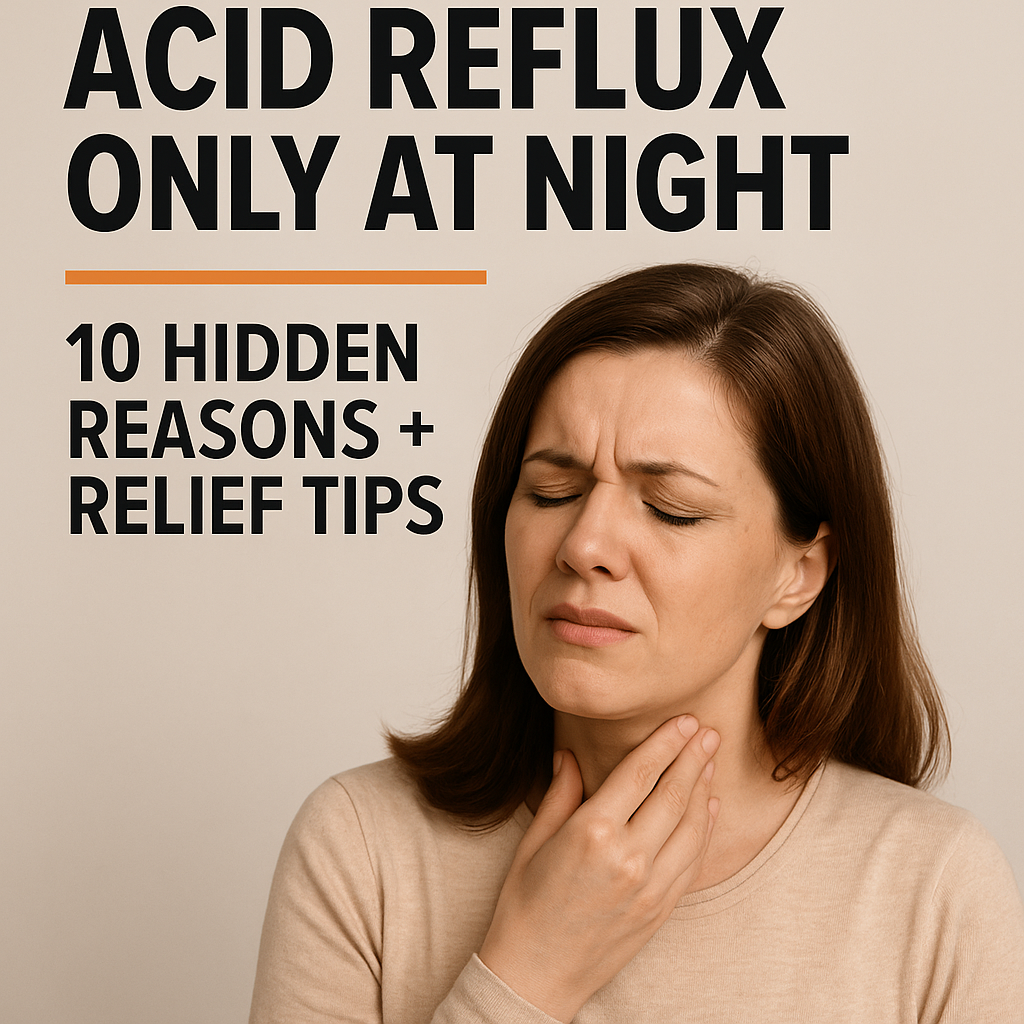
⚠️ Affiliate Disclaimer: This post may contain affiliate links, which means I may earn a small commission — at no extra cost to you — if you make a purchase through one of these links. I only recommend products or services I genuinely trust and believe can provide value. Thank you for supporting My Medical Muse!
Why Do I Get Acid Reflux Only at Night?
Ever gone to bed feeling fine, only to wake up coughing, choking, or with a burning sensation in your chest or throat? If acid reflux only seems to show up when the sun goes down, you’re not alone and you’re not imagining it.
Nighttime acid reflux, also known as nocturnal gastroesophageal reflux, is a frustrating and surprisingly common issue, in fact, it can be more damaging and harder to manage than daytime reflux. why does it only strike at night? And what can you do to stop it?
In this in-depth post, we’ll unpack the causes of nighttime acid reflux, how it affects your sleep and health, and science-backed remedies to finally get relief.
What Is Acid Reflux?
Before we dive into the night-specific triggers, let’s understand what acid reflux really is.
Acid reflux happens when stomach acid flows backward into the esophagus the tube that connects your mouth to your stomach. Normally, a valve called the lower esophageal sphincter (LES) prevents this from happening but when it weakens or relaxes at the wrong time, acid creeps up.
This can lead to:
- Burning chest pain (heartburn).
- Sour or bitter taste in the mouth.
- Burping, bloating, or nausea
- Regurgitation of food or liquid.
When it becomes chronic (happens more than twice a week), it’s called GERD, gastroesophageal reflux disease. Why Does Acid Reflux Get Worse at Night? you may be perfectly fine during the day eating pizza, drinking coffee, or even skipping meals but then bedtime hits and the burn begins.
Here are 10 reasons acid reflux shows up at night:
Lying Down Makes Gravity Work Against You
During the day, gravity helps keep stomach acid where it belongs, which is in your stomach, but at night, when you lie flat gravity is no longer pulling acid downward It becomes easier for acid to escape into the esophagus. Reflux can last longer because it doesn’t drain as easily.
You Ate Too Close to Bedtime
Eating late is a major trigger, when you eat and lie down soon after your stomach is still digesting food, the added pressure makes it easier for acid to push upward. The LES is more likely to relax, especially when full, avoid eating 2-3 hours before bed.
Your Dinner Was Acidic, Spicy, or Fatty
Certain foods are known to weaken the LES or stimulate acid production, such as: Spicy foods, tomatoes and citrus,chocolate, garlic and onion, fried or fatty meals. If your dinner is reflux-triggering, you’re setting yourself up for nighttime discomfort.
You Drank Alcohol or Caffeine in the Evening
Alcohol and caffeine both relax the LES and stimulate acid production. Even a small glass of wine, coffee, or soda at dinner can linger in your system and increase your risk of nighttime reflux.
You Have a Sluggish Digestive System at Night
Your body’s metabolism slows down at night, so food digests more slowly, causing stomach contents to linger longer which increases the chances for acid to back up.
You Have Sleep Apnea or Breathing Issues
People with obstructive sleep apnea (OSA) are more likely to have GERD because apnea causes pressure changes in the chest which can suck acid up into the esophagus. GERD can also trigger apneic events, creating a vicious cycle.
Your Sleep Position Is Making It Worse
Sleeping flat on your back is one of the worst positions for reflux because gastric acid pools in the esophagus and stays there longer. Lying on your back also increases the chances of regurgitation of stomach contents. Sleeping on your right side also worsens reflux, while the left side may help.
You’re Overweight or Pregnant
Extra weight, especially around the abdomen, increases intra-abdominal pressure. This pushes stomach contents upward, especially when lying down. Pregnancy hormones also relax the LES, making reflux more likely.
You Have a Hiatal Hernia
A hiatal hernia occurs when part of your stomach pushes through your diaphragm into your chest. It weakens the LES and It allows acid to reflux more easily especially at night
Read More: Hiatal Hernia
You’re Taking Medications That Relax the LES
Certain medications can worsen nighttime reflux:
- Blood pressure meds (calcium channel blockers)
- Muscle relaxants
- Sedatives or sleep aids
- NSAIDs (like ibuprofen)
Why Nighttime Reflux Is More Harmful Than Daytime Reflux
Nighttime reflux doesn’t just ruin your sleep, it can be more dangerous than daytime reflux because you don’t notice it as quickly. You’re asleep, so you don’t swallow as often to clear the acid. Acid lingers longer in the esophagus, causing more damage, it’s linked to more severe complications like: Chronic cough, asthma, laryngitis, dental erosion, barrett’s esophagus (a pre-cancerous condition).
Signs You May Be Experiencing Silent Nighttime Reflux.
Not everyone experiences classic heartburn. Nocturnal reflux can show up as:
- Waking up coughing or choking.
- Hoarseness in the morning.
- Sore throat or post-nasal drip.
- Bitter taste in your mouth.
- Trouble breathing or asthma flare-ups at night.
These are often signs of LPR (laryngopharyngeal reflux), also called silent reflux.
How to Stop Acid Reflux at Night: 15 Proven Tips
Now for the good news there are effective lifestyle changes and remedies to stop nighttime reflux and sleep peacefully again.
- Avoid Late-Night Meals: Give your stomach time to empty before lying down, finish your last meal at least 2–3 hours before bed.
- Raise the Head of Your Bed: Gravity is your best friend, elevate the head of your bed by 6 to 8 inches using bed risers or a wedge pillow.
- Sleep on Your Left Side: Research shows sleeping on your left side reduces acid exposure to the esophagus compared to the right.
- Limit Reflux-Triggering Foods: Common culprits includes tomatoes, citrus fruits, chocolate, peppermint,ried foods, onions,garlic. Keep a food diary to identify your personal triggers.
- Cut Back on Alcohol and Caffeine: Avoid these, especially in the evening, Opt for herbal teas like chamomile, slippery elm, or licorice root, which may soothe the esophagus.
- Lose Weight If Overweight: Even modest weight loss can reduce pressure on your LES and improve symptoms.
- Chew Gum After Meals: Chewing gum increases saliva production, which can help neutralize stomach acid and clear it from the esophagus.
- Drink Aloe Vera Juice Before Bed: Aloe vera juice may soothe inflammation and calm the digestive tract. Choose a decolorized, food-grade version to avoid laxative effects.
- Try Herbal Remedies: DGL Licorice (deglycyrrhizinated) can help coat and protect the stomach lining. Marshmallow root and slippery elm are demulcents that ease irritation. Always check with a doctor before trying supplements.
- Wear Loose Clothing: Tight waistbands increase abdominal pressure. Go for loose-fitting pajamas and avoid belts or girdles at night.
- Quit Smoking: Smoking weakens the LES and increases stomach acid production.
- Try an Antacid or H2 Blocker Before Bed: Antacids work quickly to neutralize acid. H2 blockers (e.g., Pepcid) reduce acid production for severe cases, PPIs like omeprazole may be prescribed but long-term use has risks.
- Treat Underlying Conditions: If you suspect sleep apnea, hiatal hernia, or another issue, see a specialist.
- Use a Reflux Wedge Pillow: Wedge pillows keep your upper body elevated without requiring you to modify the bed.
- Don’t Ignore It: Reflux is not just uncomfortable, it can lead to serious complications. See a doctor if you experience reflux more than twice a week, medications don’t help or you wake up choking or with chest pain.
Final Thoughts: Don’t Let Reflux Steal Your Sleep
Nighttime acid reflux is more than an inconvenience, it’s a signal that your digestive system needs attention but the good news? It’s highly manageable with the right combination of diet, sleep habits, and lifestyle tweaks, most people can control their symptoms and sleep through the night without that awful burn.
If you’re still struggling, speak to a gastroenterologist to rule out underlying issues and find the right treatment for you.
Quick Recap: 5 Things to Do Tonight to Prevent Reflux
- Eat dinner at least 3 hours before bed.
- Sleep on your left side.
- Elevate the head of your bed or use a wedge pillow.
- Avoid spicy, fatty, and acidic foods at night.
- Sip herbal tea or take a soothing supplement like DGL licorice.
👩⚕️ Need Personalized Health Advice?
Get expert guidance tailored to your unique health concerns through MuseCare Consult. Our licensed doctors are here to help you understand your symptoms, medications, and lab results—confidentially and affordably.
👉 Book a MuseCare Consult Now

